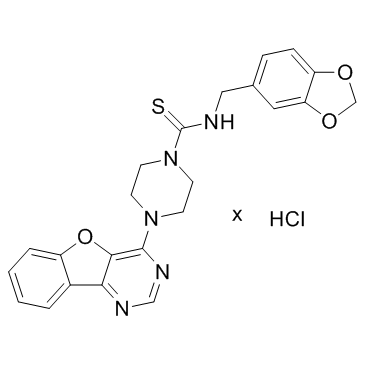1055986-67-8
| Name | N-(1,3-benzodioxol-5-ylmethyl)-4-([1]benzofuro[3,2-d]pyrimidin-4-yl)piperazine-1-carbothioamide,hydrochloride |
|---|---|
| Synonyms |
Amuvatinib hydrochloride
Amuvatinib HCl MP-470.HCL UNII-14L8O2K12B HPK56 |
| Description | Amuvatinib hydrochloride (MP470 hydrochloride) is a multi-targeted receptor tyrosine kinases inhibitor, which inhibits c-Kit (D816V), c-Kit (D816H), c-Kit (V560G), c-Kit (V654A), PDGFRα (D842V), and PDGFRα (V561D) with IC50s of 950 nM, 10 nM, 34 nM, 127 nM, 81 nM, and 40 nM, respectively[1]. Antineoplastic activity[2]. |
|---|---|
| Related Catalog | |
| Target |
PDGFRαV561D:40 nM (IC50) PDGFRαD842V:81 nM (IC50) c-KitD816H:10 nM (IC50) c-KitV560G:34 nM (IC50) c-KitV654A:127 nM (IC50) c-KitD816V:950 nM (IC50) |
| In Vitro | MP470, a novel receptor tyrosine kinase (RTK) inhibitor has shown growth inhibitory activity against a variety of cancer cell lines. MP470 is effective on LNCaP and PC-3 cells with an IC50 of ~4 μM and 8 μM, respectively. When Erlotinib (10 μM) is combined with varying doses of MP470, the IC50 of MP470 decreased to 2 μM on LNCaP cells[2]. Akt activity (as measured by phosphorylation on Ser473) is significantly reduced by 10 μM MP470 alone but is not reduced by Erlotinib or Imatinib Mesylate (IM). Moreover, MP470 plus Erlotinib completely abolished Akt phosphorylation in LNCaP cells with an unchanged total protein level of Akt[2]. |
| In Vivo | Four LNCaP xenograft arms each with 12 mice are dosed intraperitoneally with DMSO (control) or Erlotinib 80 mg/kg or MP470 50 mg/kg or Erlotinib 80 mg/kg plus MP470 50 mg/kg daily for 2 weeks and then observed for a further 11 days. Individual therapy with MP470 or Erlotinib shows modest tumor growth inhibition (TGI), while MP470 plus Erlotinib has a marked effect on TGI (45–65%). However, due to the high doses of MP470 used, only five or one mouse remained alive in the combination arm at the end of treatment or at the end of the study, respectively. Therefore the MP470 dose is reduced to 10 mg/kg or 20 mg/kg for the combination treatment. TGI in the group receiving 10 mg/kg MP470+80 mg/kg Erlotinib is not significantly different from the control group. However, mice receiving 20 mg/kg MP470+80 mg/kg Erlotinib have a significant TGI compared to the control group (p=0.01)[2]. |
| References |
| Molecular Formula | C23H21N5O3S.xHCl |
|---|---|
| Molecular Weight | 483.97000 |
| Exact Mass | 483.11300 |
| PSA | 115.02000 |
| LogP | 4.51760 |
| Storage condition | 2-8℃ |
